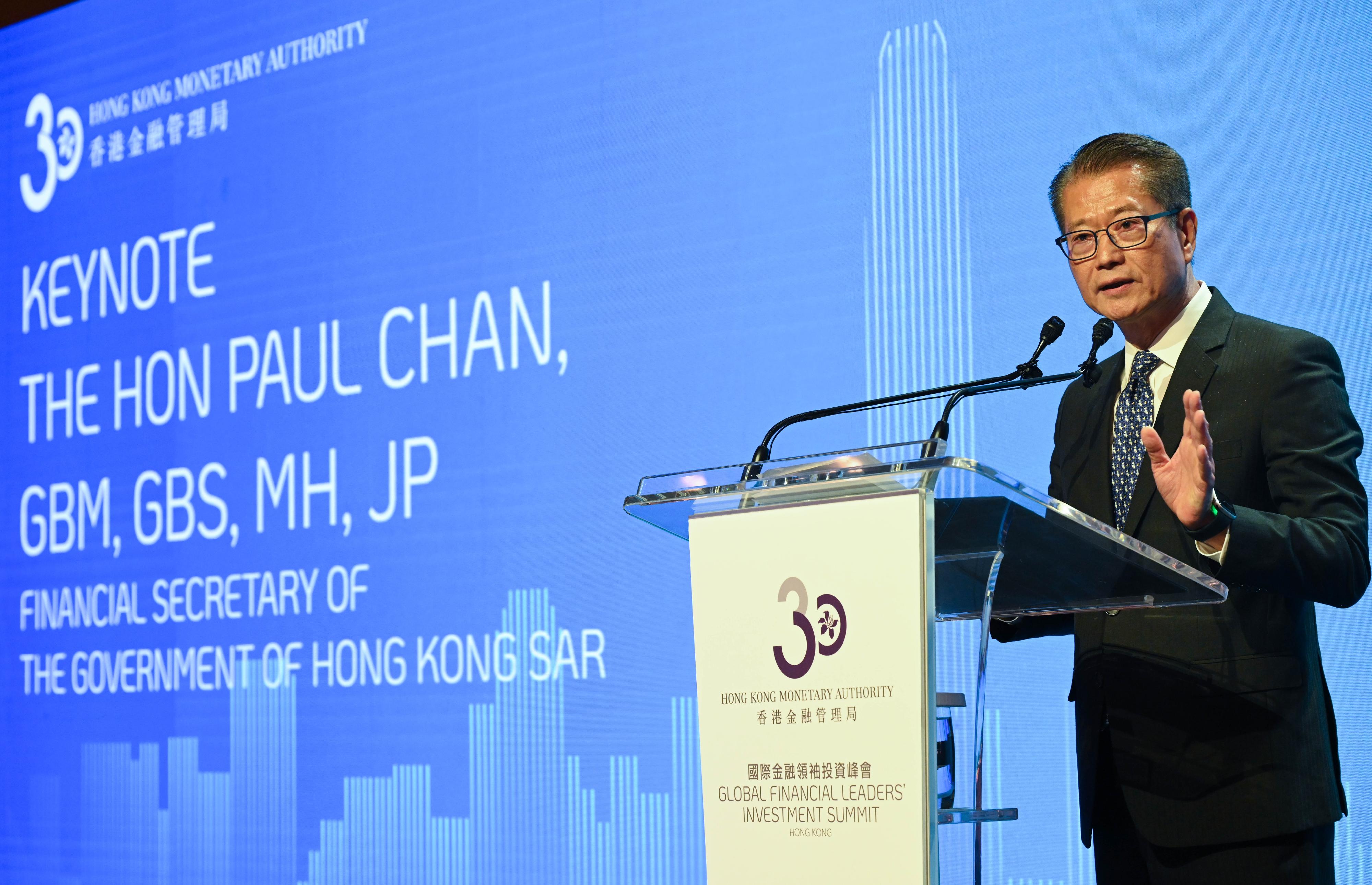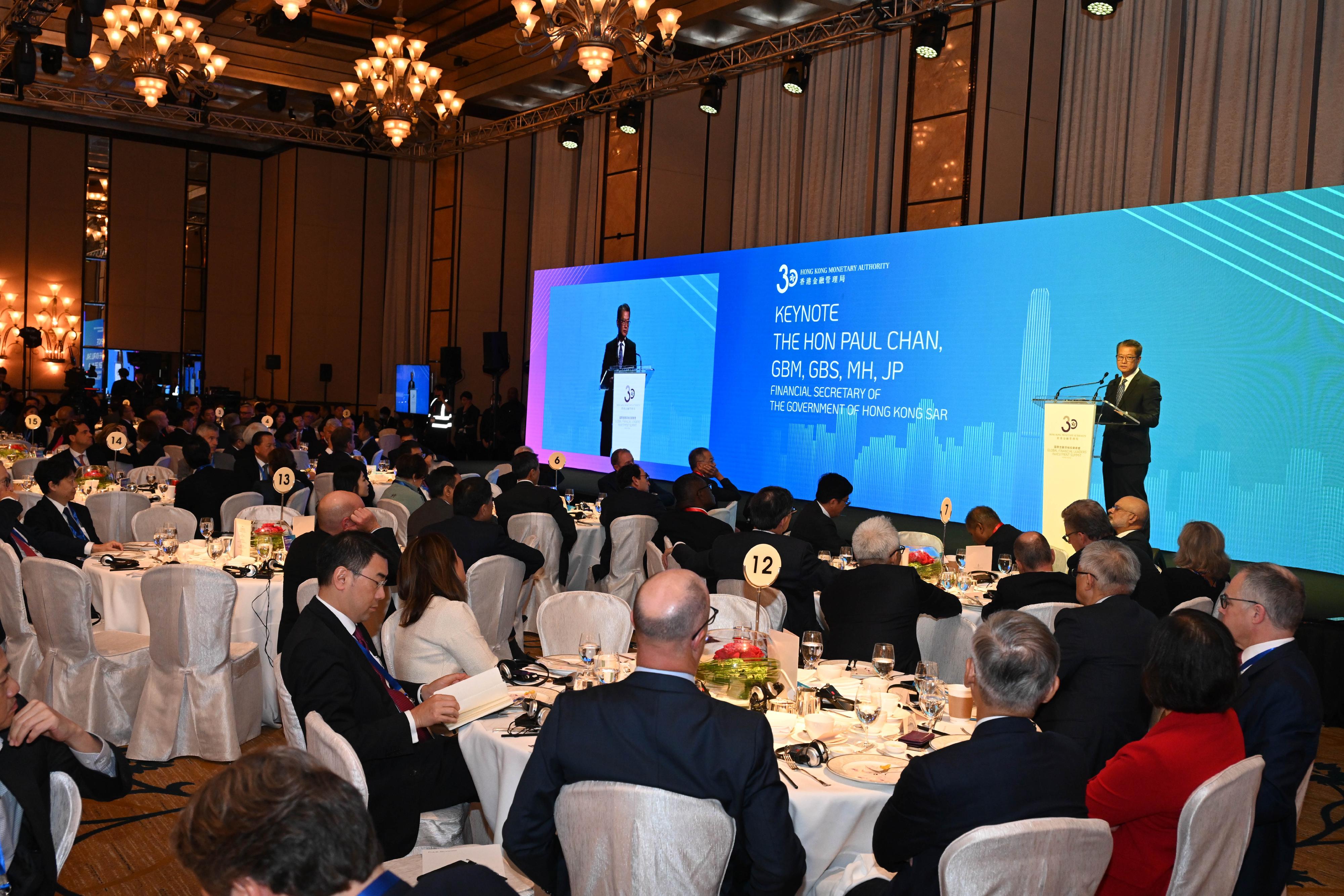Speech by FS at Global Financial Leaders' Investment Summit (English only) (with photos/video)
******************************************************************************************
肖遠企副局長 (Deputy Director of the National Financial Regulatory Administration Mr Xiao Yuanqi), Eddie (Chief Executive of the Hong Kong Monetary Authority, Mr Eddie Yue), distinguished guests, colleagues, ladies and gentlemen,
Good afternoon. What a stimulating and hard-working morning. I know you all treasure this little lunch break and look forward to your main course. I will therefore keep my remarks brief.
I wish to update you on two subjects. One relates to Hong Kong's capital market development in terms of fund flows, and the other is about Hong Kong's economy.
On the first subject, it is about Hong Kong's unique role in our country's prudent and orderly opening of its capital market, enabling the Mainland's capital to go global, as well as the internationalisation of the renminbi. In all these pursuits, Hong Kong's connectivity and international facing are the key.
On facilitating capital flow, allow me to highlight the recent enhancements to our Connect Schemes with the Mainland. As you all know, the Connect Scheme was first introduced back in November 2014, starting with the stock connect between Hong Kong and Shanghai. It was subsequently extended to Shenzhen. And in 2017, the Bond Connect was rolled out. In 2021, the Connect Scheme was extended to index futures contracts. In 2022, the inclusion of ETF Connect. And this year, there are a couple of important enhancements and developments.
One is extending the Connect Schemes from products to more derivatives, meaning that they now cover stocks, bonds, ETFs (exchange-traded funds) and risk management products, like interest rate swaps and A50 index futures. From investors' standpoint, this may not be sufficient for risk management purposes. Going forward, we will continue to work hard on other derivatives such as bond futures and A50 index options.
The second development is renminbi-denominated products. As some of you may know, on our stock exchange, 24 major stocks can now be traded in both Hong Kong dollar and renminbi at the same time. And what's more, we are working very hard for what we call the RMB counter to be included in the Southbound Connect, so that Mainland investors can access these stocks by using their renminbi, without the need of incurring extra costs and currency risks.
With the endorsement from the Mainland authorities, we are also working with regulators to include more international companies listed on our stock exchange in the Southbound Connect. This is an important development. Consider that a company from the Middle East coming here for listing could then access both international and Mainland capitals. The liquidity for the stock would be significantly enhanced, which would also be reflected in its valuation.
At the moment, we are trying hard to diversify the source of issuers and capital. Traditional markets like the US and Europe continue to be highly important. But in light of geopolitical tensions, we see a need for diversification too and are working hard to attract more quality issuers and capital to come, thus raising the liquidity of our stock market.
The second subject I would like to cover is about Hong Kong's economy. This year, despite the external headwinds, highly complex and changing circumstances, we expect our GDP growth to be over 3 per cent. While it is a little lower than what we would like to see, the recovery is sustaining. And with continuous improvements to the connectivity with the outside world, by having full resumption of international flights, more visitors will come to Hong Kong and more businesses will flow from that.
For the short term, the major driver supporting our economic growth for the rest of this year, and probably for the first quarter next year, would continue to be export of services, i.e. inbound tourism, and private consumption. For the medium-term, financial services and innovation and technology (I&T), will be our twin engines of growth.
Obviously, I don't need to elaborate on financial services. On I&T, allow me to spend a few minutes. Over the past few years, the Hong Kong SAR Government has invested around HKD$200 billion into the I&T sector in order to build a vibrant ecosystem. That will attract more companies to come. And this is important to us not just for the economy's sake, but also for creating more quality jobs for our people.
In this regard, we have chosen four areas to focus our energy on. One is artificial intelligence and big data analytics. The second is health science and biotech. And the third one is Fintech. And finally new energy, new materials and advanced manufacturing. We know that nurturing a vibrant ecosystem takes time. To fast track this development, since December last year, we launched two new initiatives. One is to attract strategic businesses to settle in Hong Kong. The second is to attract talents. Since December last year till the end of September this year, we have managed to attract more than 30 companies to settle in Hong Kong. Altogether they will initially invest over HK$30 billion and create about 10 000 jobs, most of which would be research and managerial positions.
And there are more companies in the pipeline. In this pursuit, we have made good use of our fiscal reserves, by establishing the Hong Kong Investment Corporation (HKIC). HKIC will be a helpful tool in our negotiation with strategic enterprises. Of course we want these enterprises to have certain commitments on the levels of investment, employment, and the technologies that they will bring to Hong Kong. In return, if they want us to take a minority stake, so that we put money to where our mouth is, we are willing to do so.
HKIC is now up and running. That is one part of HKIC's responsibility. The other part is that through the HKIC, we dish out mandates to general partners, asking them to invest money into sectors that would be important to the longer term development of Hong Kong.
In terms of talent, since we launched the Top Talent Admission Scheme, and we relaxed and revised other talent admission schemes, up till the end of October, we have received over 180 000 applications, and approved over 110 000 of them. And in fact, over 70 000 of these talents have already arrived in Hong Kong.
And we are facilitating them to settle into our community, including setting up a one-stop window to provide assistance in finding international school places, residences, etc. For the stamp duty in connection with acquiring their residences, we also have special arrangements in place. Talents will certainly expedite our economic development and make Hong Kong even more attractive to businesses.
Finally, in the coming decade, we will be making massive investments in infrastructure. They will include not only land and housing supply, but also transport infrastructure, including projects that will enhance our connectivity with the Greater Bay Area (GBA). For those of you in the financial sector, this presents a huge opportunity. You are most welcome to co-invest and work with us.
Thank you for this opportunity to speak to you, and let me express my heartfelt gratitude to you all for joining us in this event. We appreciate your support very much, and we do hope that apart from work, you do spend time to enjoy the city. Thank you.
Ends/Tuesday, November 7, 2023
Issued at HKT 19:56
Issued at HKT 19:56
NNNN




